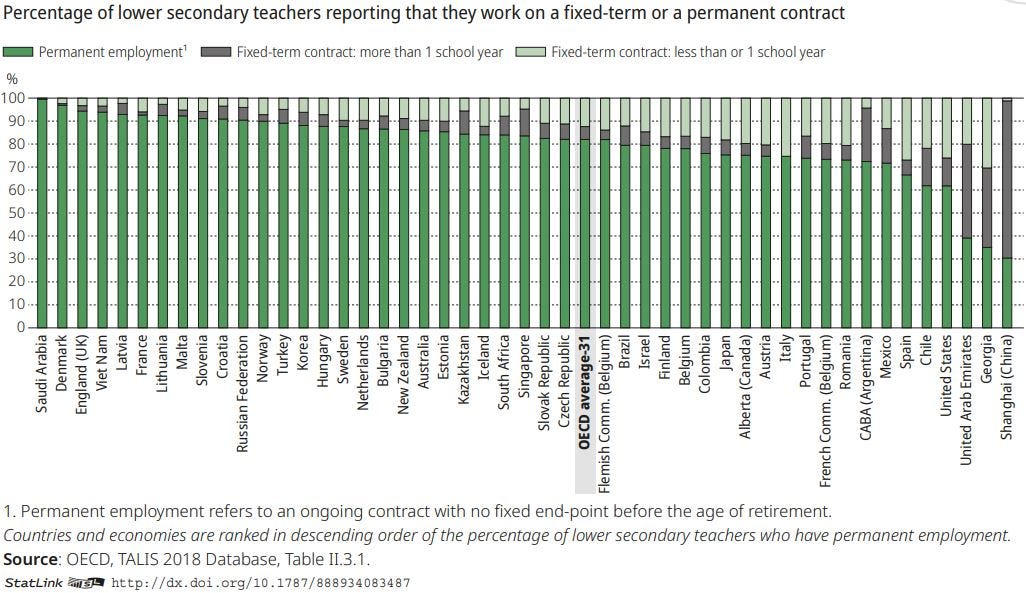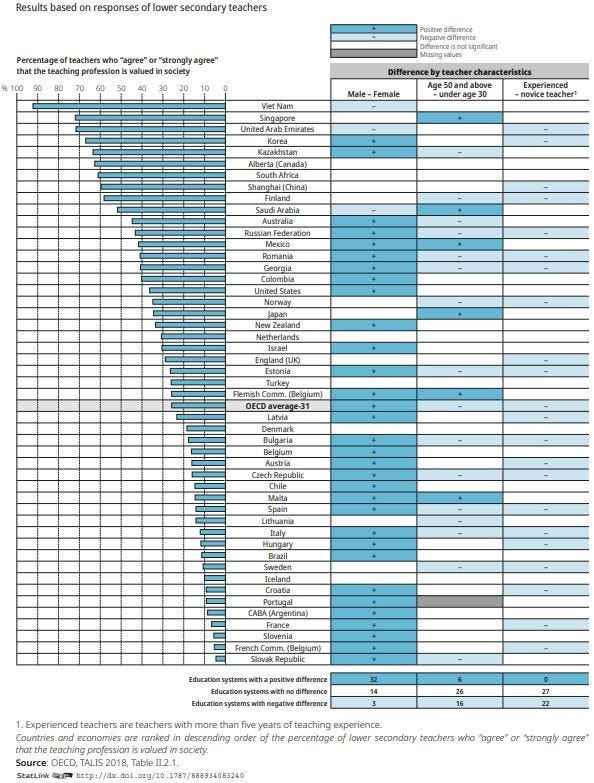Attracting motivated individuals to work in schools is a pressing concern in many OECD countries. The attractiveness of school careers, salaries and working conditions compared to alternative occupations helps attract young people to a teaching career and stick to it during their first years. However, in the long run, supportive employment conditions in schools are critical to their well-being and willingness to remain on the job. Attractive career pathways entail career structures with opportunities for professional growth and specialisation, salary scales to attract new entrants and retain experienced staff, and supportive working conditions, working time arrangements and task profiles to sustain motivation over time.
Teacher employment
Employment strategies for teachers focus on attracting, developing and retaining talented individuals capable of supporting students in developing the skills they will need to thrive.

Key messages
All schools need competent teachers to ensure high-quality instruction, but they vary in their geographical location, internal organisation and student population and therefore require a different staffing mix in their particular context. Teacher policy not only needs to ensure an adequate supply of teachers that matches demand, but also that individual schools including those in disadvantaged areas, have the teachers they need. Supporting an effective and equitable distribution of staff between and within schools requires transparent, stable and equitable staff funding mechanisms, effective and fair recruitment processes and efforts to attract professionals to where they can have the biggest impact.
Unleashing the potential of teachers to realise the transformative impacts of highly effective teaching requires creating a professional learning environment. This should provide teachers with individual and collective support through rigorous preparation tailored to their specific working context, as well as through induction and mentoring to promote skill development in the school setting and beyond the early years in a new role. Schools must increasingly evolve into environments where professional learning is an ongoing part of the day-to-day work, school staff work collaboratively to help each other learn, and systems exist to capture and codify knowledge.
Context
Contract status
On average across OECD countries and economies in TALIS, 82% of teachers have permanent contracts, 6% have fixed-term contracts for more than one year, and 12% have a fixed-term contract for one year or less.
Teachers’ employment on fixed-term contracts (2018)

Teachers’ perceptions of the value of the profession
On average across the OECD countries and economies that participate in TALIS, only 26% of teachers “agree” or “strongly agree” that their profession is valued in society.
Teachers’ views of how society values their profession, by teacher characteristics (2018)

Related publications
Programmes and projects
-
The OECD Indicators of Education Systems (INES) programme seeks to gauge the performance of national education systems through internationally comparable data.Learn more
-
TALIS - the Teaching and Learning International Survey - is the world's largest international survey about teachers and school leaders.Learn more
-
PISA is the OECD's Programme for International Student Assessment. PISA measures 15-year-olds’ ability to use their reading, mathematics and science knowledge and skills to meet real-life challenges.Learn more
-
The Education Policy Outlook is an analytical observatory that monitors the evolution of policy priorities and policy developments from early childhood education to adult education, mainly among OECD education systems, to provide a comparative understanding of how policies are evolving, and how they can be best implemented or improved over time.Learn more
-
The OECD’s programme on education and skills policy support policymakers in their efforts to achieve high-quality lifelong learning, which in turn contributes to personal development, sustainable economic growth, and social cohesion.Learn more
-
The OECD’s expanding evidence base has highlighted the importance of high-quality teachers and teaching in education. Yet, challenging questions remain, and there is a need for space in the teacher debate to anticipate future developments, to strengthen professional identity and to support proactive teacher policy making.Learn more
-
Since 2013, the OECD has gathered evidence on how school resource policies work in different contexts. The focus is now on digital resources to enable countries to learn from each other in the digital transformation of their education.Learn more
-
The Teacher Knowledge Survey (TKS) examines what teachers know about teaching and learning, and how their specialised knowledge of pedagogy relates to their work and training.Learn more






